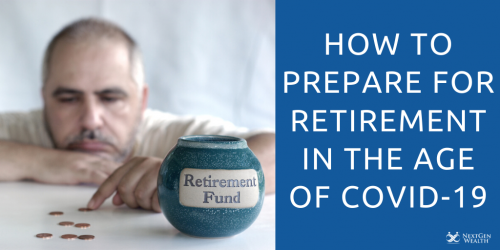How to Prepare for Retirement in the Age of COVID-19
Since the novel coronavirus began spreading across the globe, it has impacted everything about our daily lives. However, while some of the effects were immediate, such as quarantines and lockdowns, one of the less obvious was how it would impact retirement planning. 
In this article, we want to look at the various ways that COVID-19 has disrupted retirement plans. To help understand these effects better, we’re going to look at the three stages of planning - early, pre-retirement, and retirement. We’ll also pay attention to the various legal changes that were inside the relief bill passed in March.
Changes to Retirement Accounts From the CARES Act
Before we can get further into our discussion of how to plan, let’s first look at the components of the Coronavirus Aid, Relief, and Economic Security (CARES) Act. Specifically, changes made to the way individuals could interact with their retirement accounts.
First, it’s crucial to note that these provisions were written so that only those directly impacted by COVID-19 can participate. To qualify for these changes, an individual has to meet one of the following criteria:
- Be diagnosed with COVID-19.
- Have a spouse or a dependent (i.e., a child) diagnosed with the disease.
- Be laid off, fired, or furloughed as a result of businesses closing from stay-at-home orders. This provision also includes parents who can’t return to work because of a lack of daycare and schooling options.
Assuming that you meet these stipulations, there are three ways the act changed retirement accounts.
Double Withdrawals from 401(k)
Normally, you can borrow up to $50,000 from your 401k account, or 50% of your vested contributions (whichever is less). Because of the virus, however, individuals are allowed to take up to 100% of their contributions, up to $100,000. The time frame for taking out one of these loans is March 27th to September 23rd, 2020.
When repaying one of these loans, you’ll still have five years to pay off the balance plus interest. However, the clock doesn’t have to start immediately. Qualified applicants can opt for the five-year deadline to begin in 2021 instead.
The interest rate will be dependent on the plan you have, such as 1% over the Prime Rate. You’ll want to verify this percentage before taking out a loan, so you’re not caught off guard.
Early Withdrawals
One of the ways that the IRS prevents contributors to take money out of their IRA’s early is to impose a 10% penalty on withdrawals before one turns 59 1/2. With the CARES Act, that penalty no longer applies.
So, if you’re in your 30s and want to withdraw from your IRA or 401k, you can do so worry-free. Again, the maximum is $100,000 total, taken from as many accounts as necessary.
That being said, the IRS is also forgoing tax collection on withdrawals from IRA’s and employer-sponsored accounts, at least through 2020. However, just because the IRS isn’t taking it now doesn’t mean you’ll never have to pay. So, if you do take advantage, we recommend stashing the taxes and penalty immediately, so you have it once the bill comes due.
Another thing to keep in mind is that you’ll still have to pay the taxes, even if you lose your job. Thanks to the Tax Cuts and Jobs Act of 2017, you’ll have until October of 2021. Before, you only had 60 days to pay it off.
However, depending on how things come back to normal between now and then, some borrowers may need more time. Just be sure you’re aware of this stipulation before taking any cash.
No Required Minimum Distributions for 2020
Those who are already retired and taking RMDs can elect to skip it this year. This new rule also includes spouses who are withdrawing from qualified accounts. If you already took the RMD for the year, you can return the funds if you like.
However, there is a 60-day statute of limitations on that. If the withdrawal was more than 60 days before the law was passed on March 27th, you’re out of luck.
Now that we know how this act affects retirement accounts, let’s dive into some practical advice that you can use in the wake of this pandemic.
Early Retirement Planning - Age 55 or Less
Although the stock market took a pretty steep dive in March, it has since rebounded and shows signs of a full recovery. The country still has a long way to go, and a volatile election year can influence the market, but it will eventually bounce back to pre-coronavirus levels.
So, if you were hesitant about putting money into accounts or stocks, don’t be. In fact, you can take advantage of low prices. Since retirement planning is all about the long-term benefits, taking action now will be a smart move. Here are some other tactics for those who have a while before retiring.
Take Unemployment
Rather than pulling money from an IRA or 401k, you should be collecting unemployment. Unfortunately, many states are overrun with claims, so delays have been rampant during this crisis.
However, if you can start to collect unemployment due to a layoff or furloughed hours, take advantage as much as you can. Currently, there is a $600-per-week addition for recipients, although that is due to expire at the end of July.
Plan for a Worst-Case Scenario
As we wait to see how America’s reopening plan goes, we recommend being cautiously optimistic. While the rollout of these plans has been a bit disorganized, they show some signs of working.
Depending on where you live, businesses might be able to get back on track sooner than later. However, you should also be prepared in case COVID-19 cases start to spike again, and quarantines come back into effect.
You should plan for a long-term worst-case scenario as well. Many businesses have stopped offering match guarantees on 401k plans due to reduced income, so you’ll have to make that up later on. Also, the chances of losing your job entirely can be relatively high, although it might be too soon to tell.
Overall, you should look at the options available, even if they include looking for new employment as the pandemic continues. Try and limit withdrawals from retirement accounts for as long as possible so that they can continue to grow.
Pre-Retirement Planning - Between 55-65
If you’re already close to retiring, this crisis may speed things up for you. Unfortunately, if you do retire early, you’ll be limiting how much you can earn on social security. So, if you can avoid claiming these benefits until you reach at least full retirement age, that will help you in the future.
If you can wait even longer, you can continue to raise your benefits until age 70. After that, there’s no point in waiting anymore since they no longer increase.
Downsize Your Expenses
One challenge that many in this age bracket will face is the prospect of not getting rehired once the pandemic is over. Those who are already past age 60 will have a much harder time competing against a young workforce, particularly if there are fewer jobs to go around because of the crisis.
So, before waiting for that day, now is the perfect time to downsize your expenses. Create a list of your highest bills and see where you can trim the fat. You might have to make some tough choices now, but the sooner, the better, as you can avoid hitting some even worse roadblocks down the road.
Embrace Technology
While many businesses are faltering during these times, some are thriving. The demand for remote workers has increased, which can allow you to earn extra cash without putting yourself in harm’s way. Plus, becoming more techno-literate can benefit you overall, as it will be easier to stay connected with friends and family during this crisis.
Another benefit of technology is that it enables patients to get virtual checkups with their doctors. This way, you can avoid dangerous exposure to the virus without sacrificing your health.
Meet With Your Financial Planner
No one expected the virus to hit as hard as it did, which means so many Americans were unprepared. Before making any rash decisions, be sure to talk to your advisor first.
Now is the time to reassess your financial goals and needs, as well as the various options available to you. In some cases, you might have to keep working past 65 to make up for these losses. In other instances, you might have to sell assets to stay afloat before taking social security.
Regardless of your situation, you need to go into it with both eyes open. The pandemic is a monumental moment in history, but that’s no reason to start panicking. Take a calm and collected approach and weigh your options, both good and bad.
Retirement Planning - 65 and Up
If you were already in retirement when COVID-19 hit the scene, hopefully, you’re relatively unscathed. Again, seeing the stock market drop so significantly might have been worrisome, but now those fears should be put to rest. Still, you can be affected by the virus in many other ways, so here are some tips for getting through this crisis.
Avoid Taking RMDs for the Year if Possible
For many retirees, RMDs are a necessary part of life, but not always. In some cases, these distributions might just be adding to your total income for the year which thus increases your taxes.
So, if you’re not hurting for cash, it can be a good idea to let the funds sit and grow for a few more months. This is a rare opportunity, so if you can afford to take it, we highly recommend it.
Get Healthy
Since adults over 65 are the most at-risk of dying from COVID-19, there is a lot of nervousness and fear among this age group. While you should be paying attention to your health no matter what, now is the time to be more vigilant.
Take advantage that you can’t go out and start making healthier meals. Walking outside is still a viable form of exercise - just be smart and avoid crowded areas.
The more in-shape you are, the less likely you’ll have to visit your doctor in-person during this crisis. Right now, the primary goal is to minimize risks, and a healthier body is the perfect way to do that.
Save Money
One potential benefit of being in quarantine is that you can’t spend your money on vacations, eating out, and other activities. So, take advantage of this time as much as possible. While you shouldn’t restrict yourself altogether (help your local restaurants if you can), you should be saving the money you’d otherwise be using.
For example, if you had a trip planned for the summer, take those funds and put them into a one-year CD. This way, once you’re ready to go back out, you’ll have gained some extra free money.
Contact NextGen Wealth Today
If you need assistance with retirement planning in the era of COVID-19, we’re here to help. This crisis has put a strain on a lot of elements of daily life, but your financial health shouldn’t be one of them. We can assist you with strategies to ensure that you don’t have to put your retirement on hold. Call us today to find out more.



